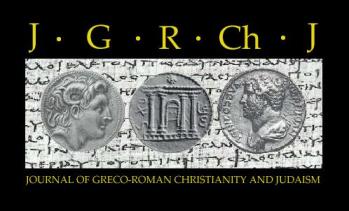3.1 | Messianic Hopes and Messianic Figures in Late Antiquity Craig Evans Acadia Divinity College, Wolfville, NS Recognizing the importance of messianic expectation in the ancient world,
Evans explores the range of messianic hopes and types of messianic figures to be
found in late antique Judaism, the Roman world and early Christianity. |
3.2 | The Messianic ‘Son of David’ in Matthew Richard Van Egmond Hamilton, ON Providing a detailed exploration of a single Gospel, Van Egmond explores the
son of David messianic concept in Matthew’s Gospel, emphasizing how it is used
throughout, including the passion account. |
3.3 | Aristotle on Justice (δικαιοσύνη): Character, Action and Some Pauline
Counterparts Ronald Weed Tyndale University College, Toronto, ON Weed explores the notion of justice as requiring character and behavior in
Aristotle, and finding correlates in the treatment of justice in Paul. |
3.4 | Paul and Plutarch on Boasting Michael Wojciechowski Wydzial Teologii UWM, Olsztyn, Poland Wojciechowski shows that Paul sometimes conforms to ancient rhetorical
expectations regarding boasting, while other times he takes a bold and independent
line that goes against the tradition. |
3.5 | Romans 7 and the Split Between Judaism and Christiainity Barry F. Parker California Baptist University, Riverside, CA In addressing Romans 7 to Jewish within mainstream Judaism in Rome, Paul
argues that rather than continuing to meet the demands of the law they should live
by the Spirit. |
3.6 | Paul's 'Friends' The Asiarchs (Acts 19.31) Craig S. Keener Palmer Theological Seminary, Wynnewood, PA Keener argues that the Asiarchs may have been those of the political elite who
may have served as patrons to Paul, who would have been known as an important
speaker. |
3.7 | The 'Genitive Absolute' in New Testament/Hellenistic Greek: A Proposal for
Clearer Understanding Lois K. Fuller McMaster Divinity College, Hamilton, ON Fuller argues that the ‘genitive absolute’, perhaps better called the genitive
construction, provides necessary background information and provides textual
cohesion in narrative. |
3.8 | Contextual Disconnection in Bart Ehrman's Lost
Christianities Jonathan M. Watt Geneva College, Beaver Falls, PA Watt raises six objections to Ehrman’s work in terms of the context in which
it is written and what it purports to accomplish. |
3.9 | Luke's Preface and its Relationship to Greek Historiography: A Response to
Loveday Alexander Sean A. Adams McMaster Divinity College, Hamilton, ON Adams argues that the closest parallels to Luke’s preface are found in the
corpus of ancient classical historians, rather than the scientific prefaces.
|
3.10 | Ad Herennium Argument Strategies in 1 Corinthians Robert Stephen Reid University of Dubuque, Dubuque, IA Reid argues that Paul, in composing his argument in 1 Corinthians, made
conscious and extensive use of the strategies found in the Ad Herennium. |

